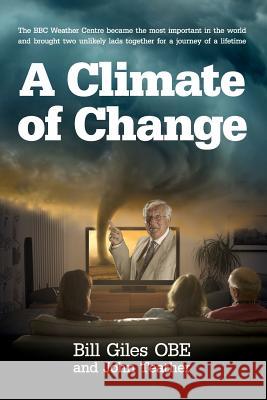A Climate of Change » książka
A Climate of Change
ISBN-13: 9781539406457 / Angielski / Miękka / 2016 / 248 str.
A Climate of Change
ISBN-13: 9781539406457 / Angielski / Miękka / 2016 / 248 str.
(netto: 179,19 VAT: 5%)
Najniższa cena z 30 dni: 185,59
ok. 16-18 dni roboczych.
Darmowa dostawa!
Weather is a national obsession. It is well-known to be the first topic in any conversation. It either delights or depresses. When we have long hot periods we look for rain, and after the rain we seek the sun. Our weather in the UK is a topic of conversation throughout the world as it illustrates the stoic nature of the British Nobody who lives on our island is excluded from the effects of our weather, be it a mother hoping for sun on her daughter's wedding day, to those caught in the recent flooding, to those who daily live their lives with the weather such as farmers and fishermen. Ever since the first radio broadcasts by the BBC in 1926 weather was a feature. Even when the first public Television service started in 1936 it included a weather forecast. Then in 1954 the BBC introduced the first weather TV forecast with a 'weatherman'. Today we take for granted our weather forecasts not realising the technological and presentational changes that have taken place over the years. Good television always looks easy, because all of the elements come together to produce a result that is more than the sum of all its parts. The journey from 1954 to today involved a whole range of innovations for both the Met Service and the BBC, not only technical, but understanding how to communicate our very complicated atmosphere in a way that 'the man in the street' could readily understand. Bill Giles OBE, one of the nation's best-known weather presenters, and John Teather, the founder of the BBC Weather Centre worked together to revolutionise how weather was presented and turn the BBC and the UK Met Office into world leaders in this field. Their new book is not a history lesson, but a 'peep behind the curtains' at the world of broadcast meteorology, sometimes fraught, many times difficult, often funny and always challenging. It reflects the personalities such as Fish, McCaskill, Kettley and Charlton who were household names. It explores two of the nation's great institutions - The BBC and the Met Office as they both struggled with enormous internal change. It is a book that doesn't fit in the normal categories. To make excellent broadcast weather reports takes many different resources and talents and perhaps this book is a reflection of this many faceted approach. Not autobiography, not history, not scientific paper, not tales out of school, not learned journal - but simply an exciting journey. But the book also shows how a shared vision of two very different people, from entirely different backgrounds, can work together to realise a dream and take on the world.
Zawartość książki może nie spełniać oczekiwań – reklamacje nie obejmują treści, która mogła nie być redakcyjnie ani merytorycznie opracowana.











